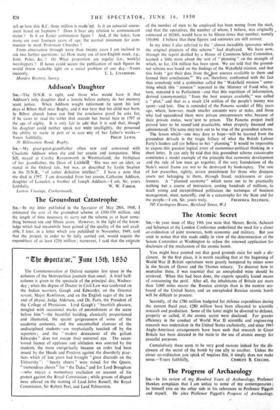The Atomic Secret SIR,—In your issue of May 19th you
state that Messrs. Bevin, Acheson and Schuman at the London Conference underlined the need for a closer co-ordination of joint resources, both economic and military. But you omit to notice that this reads oddly in view of the determination of the Senate Committee at Washington to refuse the renewed application' for disclosure of the, mechanism of the atomic bomb.
You might have pointed out that good grounds exist for such a dis- closure. In the first place, it is worth recalling that at the beginning of World War II British operations were greatly hampered by mines sown in the Straits of Dover and the Thames estuary. To discover how to neutralise these, it was essential that an unexploded mine should be retrieved. When this had been done, the experts speedily found means of overcoming the peril. After all, the inhabitants of Britain are more than 3,000 miles nearer the Russian airstrips than is the eastern sea- board of the United States, and an unexploded Russian atomic bomb will be difficult to procure.
Secondly, of the £780 million budgeted for defence expenditure during the current fiscal year, £280 million have been allocated to scientific research and production. Some of the latter might be diverted to defence, properly so called, if, the atomic secret were disclosed. For greater efficiency in the conduct of World War II scientific and engineering research was undertaken in the United States exclusively, and since 1945 Anglo-American arrangements have been such that research in Great Britain has been directed in the main to the use of atomic energy for peaceful purposes.
Cumulatively these seem to be very good reasons indeed for the dis- closure of the secret of the bomb by one ally to another. Unless the closer co-ordination you speak of requires this, it simply does not make




































 Previous page
Previous page